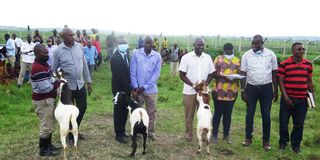Govt gives income projects to former wetland encroachers

Ntungamo District leaders hand over goats to former Rufuha wetland encroachers last week. PHOTO | PEREZ RUMANZI
What you need to know:
- Districts in Kigezi have been categorised under the Maziba basin while those in Ankole have been put under the Rwizi basin with the aim of restoring wetlands.
The government with funding from the European Union has offered alternative livelihood projects to former wetland encroachers in Ntungamo District to avert the dangers associated with climate change.
At least 100 families were evicted from the Rufuha wetland, which stretches from Kayonza Sub-county to Kafunjo-Mirama Town Council in 2018. They were promised alternative livelihood if they vacated.
The district natural resources officer, Ms Dinah Tumwebaze, last week gave the families goats, fish ponds and irrigation schemes.
“These are the livelihood options that they have identified themselves and we have given because they have willingly left the wetlands. We want more groups to be formed so that they can benefit from this project so that we can be able to sustainably maintain and restore wetlands for future development,” Ms Tumwebaze said.
The beneficiaries from Kayenjojo Bariisa Barungi B, Kyenjojo Bariisa Barungi A and Kyenjojo Fish Farmers received 56 goats, five fish ponds and climate resilient early warning information centres.
The district vice chairperson, who is also the secretary for production, Mr Asuman Kigongo, said people had lost hope in the government since the project had been delayed for more than three years.
“This is a good measure by the government to compensate people who are evicted from wetlands. However, when people are promised such compensation, they should not be delayed. People start thinking that the government lied to them,” Mr Kigongo said.
The Kakukuru- Rwenanura town council chairperson, Mr Kahinda Mesarch, said the gesture will give people reasons to appreciate environmental conservation.
The project is also being implemented in other areas with rivers contributing to Lake Victoria basin.
Districts in Kigezi have been categorised under the Maziba basin while those in Ankole have been put under the Rwizi basin with the aim of restoring wetlands.
According to Ms Tumwebaze , the district has a total land area of 2,051 square kilometres. Wetland covers 3.4 percent of the total land area and 0.2 percent is covered with water. More than 80 percent of the wetlands have been encroached on.




